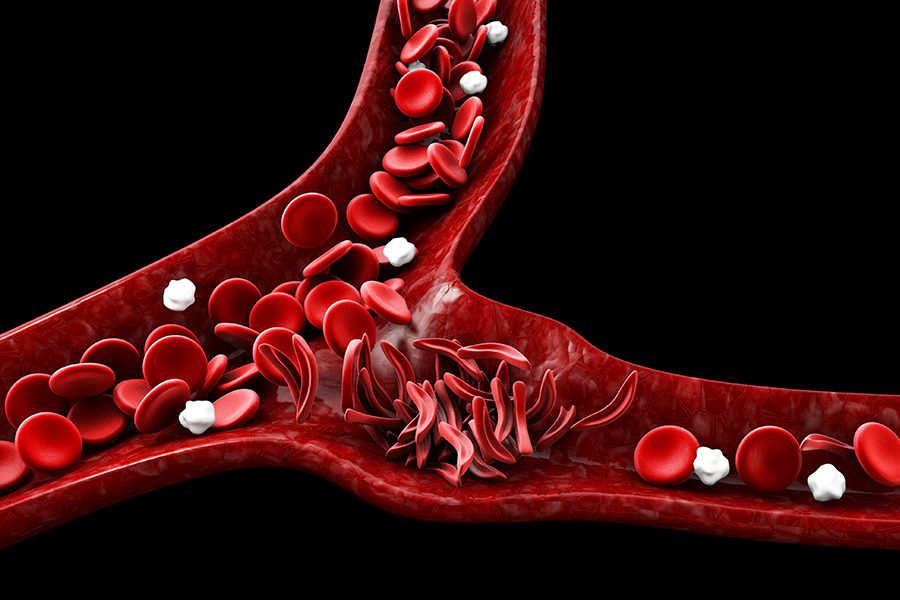International Registry Reveals Risks COVID-19 Poses with Sickle Cell Disease
February 1, 2022
When the COVID-19 pandemic began, nothing was known about how the new viral illness would affect people with sickle cell disease (SCD). That lack of knowledge spurred NCATS-funded researchers to rapidly develop a collaborative registry that collects data worldwide on COVID-19 illness in people with SCD. Insights from this innovative tool have accelerated vaccination for people with SCD and sharpened treatment approaches for patients, families and health care providers.
The Surveillance Epidemiology of Coronavirus Under Research Exclusion for Sickle Cell Disease (SECURE-SCD) Registry is an international collaboration of researchers, clinicians and people with SCD working together to understand how COVID-19 affects the health outcomes of those with SCD. Sickle cell disease is a group of inherited blood disorders characterized by C-shaped red blood cells that resemble a sickle. People with SCD are at greater risk of serious illness and death from viral infections — including respiratory infections, such as influenza. Infections often exacerbate SCD complications.
Responding nimbly to fill the knowledge gap at the pandemic’s start, scientists at the Medical College of Wisconsin — a Clinical and Translational Science Awards (CTSA) Program hub — brought the registry to life in just one week. Since March 2020, SECURE-SCD has collected voluntary reports on COVID-19-related outcomes among more than 900 people with SCD in 18 countries. Nearly half of the reports are on children with SCD. Aggregated data are publicly viewable on the registry’s website, including information on COVID-19 symptoms, treatments and outcomes.
An early study of the registry data quickly revealed that people with SCD are at greater risk of serious illness, hospitalization and death from COVID-19. Those findings prompted the Centers for Disease Control and Prevention to designate SCD as a high-risk illness and recommend that people with SCD be among the first to receive COVID-19 vaccines.
In a recent study in the journal Blood Advances, Medical College of Wisconsin researchers used SECURE-SCD data to explore the specific factors that may fuel worse COVID-19 outcomes — specifically, serious illness and hospitalization — in children and adults with SCD. They also explored the effect, if any, that taking the common SCD treatment hydroxyurea had on COVID-19 illness.
Pain, acute heart and lung problems, and SCD-related kidney problems emerged as the primary red flags of risk for serious COVID-19 illness and hospitalization among people with SCD. Among the key findings were the following:
- Serious COVID-19 illness was twice as likely in adults with SCD who had frequent acute care visits for pain prior to infection. Hospitalization also was more likely among adults with SCD who had frequent acute care visits for pain prior to infection.
- Pain before COVID-19 proved to be an excellent predictor of pain during COVID19 illness. Children with frequent acute pain episodes before COVID-19 were nearly seven times more likely to experience pain during COVID-19 illness. Adults with prior acute pain episodes were more than twice as likely to experience pain during COVID-19 illness.
- Children with SCD were at greater risk of hospitalization during COVID-19 illness if they had frequent acute care visits for pain before COVID-19 infection or had SCD-related heart and lung problems.
- Serious COVID-19 illness was also more likely in both children and adults when SCD-related health problems — such as kidney, heart or lung issues — were present.
Given the links between pain and worse COVID-19 outcomes — and that pain often was the only COVID-19 symptom for patients in the registry — the researchers recommended that clinicians test for COVID-19 in anyone with SCD who presents with pain.
To contribute or view COVID-19 outcomes data in people with SCD, visit the SECURE-SCD Registry at https://covidsicklecell.org.



